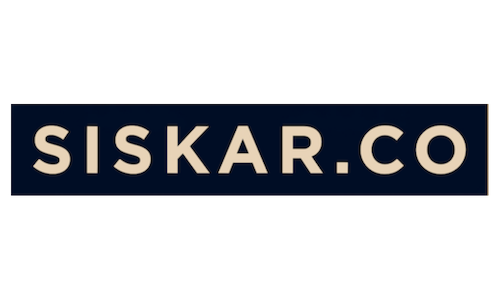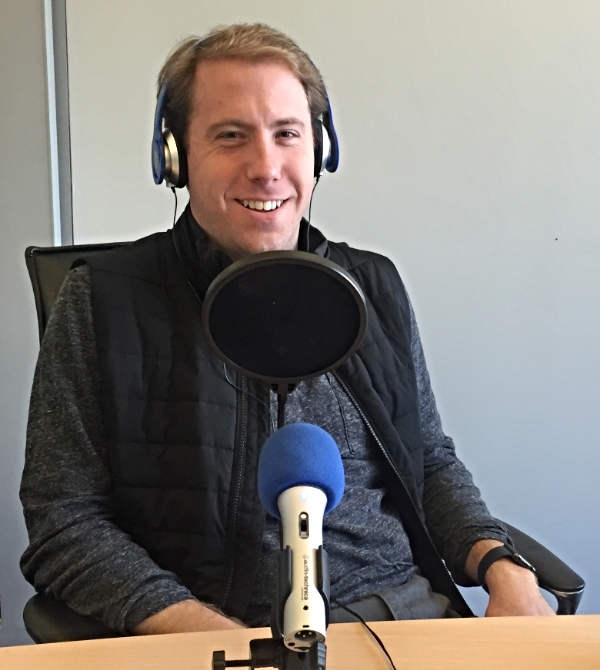
Ambition Today: Adam Besvinick Teaches The Art of Hustle and How To Break Into Your Dream Role
Venture Capitalist Adam Besvinick explains the value of pure hustle in pursuing his dreams of breaking into the Startup and Venture Capital industry. Recently named to the Forbes 30 Under 30, Adam has invested in several startup companies as Principal at Deep Fork Capital.
Adam Besvinick, Principal VENTURE CAPITALIST aT Deep Fork Capital
Venture Capitalist Adam Besvinick explains the value of pure hustle in pursuing his dreams of breaking into the Startup and Venture Capital industry. Recently named to the Forbes 30 Under 30, Adam has invested in several startup companies as Principal at Deep Fork Capital.
In episode 14 we explore where Adam came from and how that connects to where he is now. Adam started blogging on VentureMinded.Me years ago and created his own track record through taking ownership of his brand. He has always strived to be continually helpful and add value to others. Through that hustle he previously worked his way into a role at Lowercase Capital to learn from Chris Sacca. Afterword Adam was one of the early employees at Gumroad while going to Harvard Business School. Now Adam is Principal at Deep Fork Capital and has invested in several companies across the country, with a focus on New York City and Silicon Valley. We go over what he looks for in great startups, how he used self-marketing to break into venture capital, and also cover:
The influences of growing up around entrepreneurship.
The value of experiencing life abroad.
How to demonstrate your expertise in a given field.
Why self-marketing is important.
How Twitter can create real world connections.
How constantly being helpful to others, leads to opportunity.
His experience at Duke and Harvard.
The differences between Silicon Valley and New York City.
How being an Investor in New York City is beneficial.
What Adam looks for in startups today.
Exploring some of the Deep Fork Capital portfolio companies.
Ambition Today Question of the Day:
How important is networking?
Links from this episode:
Thank you so much for listening and applying these useful tips and strategies to your life! If you have a chance, please drop by and leave a review for the show on iTunes by clicking here. Also, who should I interview next? Please let me know on Twitter or in the comments. Do you enjoy this podcast? If so, please leave a short review in the comments below. It keeps me going…
Be sure to listen and subscribe to Ambition Today in the iTunes Store for iOS and on Stitcher for Android.
Listen to this episode now:
Ambition Today Podcast Sponsors:
Audible.com
Founder Institute New York
Moving To New York City
New York City. The Big Apple. The Nexus of the Universe. Whatever you call it, it is one of the most unique places on earth and 8.4 Million people call it home. Many of those people moved here from other places in order to pursue their dream. New York City is the promise land of opportunity in the United States. However, moving to New York City is hard.
New York City. The Big Apple. The Nexus of the Universe. Whatever you call it, it is one of the most unique places on earth and 8.4 Million people call it home. Many of those people moved here from other places in order to pursue their dream. New York City is the promise land of opportunity in the United States. Moving here however is no easy task. Getting a job in New York City without living here makes it next to impossible to get called in for an interview and securing an apartment in the cities crazy real estate market is a whole new world within itself. The city is expensive, the city is unforgiving, and the city is challenging.
While living in Buffalo I knew that I wanted to move to New York City and that I wanted to get involved with startups there. I applied to jobs for months before actually moving to New York City. The call's I got back for an interview were to come into the office in a day or two, but I was still 600 miles away in Buffalo. I needed to be closer if I was going to make any progress. I flew to New York City on a day in July with Colleen to try and get us an apartment, but we quickly learned we couldn't get approved in a nice building without a job. After viewing a dozen apartments with a broker we finally got approved by a building. We were quickly educated that being as this was July, where apartments can come on the market in the morning and be immediately off the market after lunch we had to decide fast if we wanted an apartment or not. We took it; real estate broker fee, deposit and all.
A month later we moved to New York City. After struggling just to get into the city I still had to find a job though. I ran out of money shortly after moving to New York City and ended up having to sell my car, which I had payed off while working bartending jobs during college. That only bought me a few more months of runway though. So I took a bartending job that I was able to get through a friend of a friend in Buffalo who happened to do some business in New York City (See Buffalo really is the "The City of Good Neighbors"). The bartending job was part time and still wasn't enough. Again, I was slightly better off than before but not by much. So I took a second job freelancing and working remotely online in the early mornings, writing for a tech website. I was still applying to potential full time jobs and taking interviews in my spare time. The cycle became that I would work bright an early in the morning, then apply to jobs and interview during the day, and finally bartend at night. Repeat. Repeat. Repeat.
I remember distinctly getting down to $20 in my bank account at this time while I would be waiting for my next paycheck to come in from either of the jobs. I was very close to having to move back to Buffalo. After months of this I finally got a full time job offer out of one of the interviews. I still remember being out to lunch. Colleen and I had company in town visiting us. We were talking about how life in New York has been treating us so far while eating cheeseburgers and I got a phone call. It was my future boss saying that the company would love to hire me and asked when I could start. It was an entry level job but it was enough that I could break even, pay my full rent, student loans, and live in New York City. Since that day, there have been hardships and challenges of course, but I am here. I live in New York City. Casey Neistat last year told a very similar story of his struggle in moving to New York City. How moving here can eat you alive and strip you of all your resources in the process. That even just getting set up to live in New York City is one of the greatest challenges people face.
He explains at the end of the video how it has all been worth it though. How for him the opportunity has out weighed the tremendous cost of moving to New York City in the first place. I have to agree. The opportunities the city has afforded me since then have been tremendous. I get to experience new products, stores, movies, foods, services, and crazes in New York City long before people in other parts of the country. So many experiences. I am always surrounded by ambitious and motivated people here. I feel privileged and love what I get to do now with startups. It was not easy though. So as you can see there is a reason Sinatra once said if you can make it here, you can make it anywhere.
Quit Your Job, Grow Your Startup
Working corporate from 9-5pm and startup business from 5-2am. It is not easy but you will make progress. After all work is work and you are doing something, which is always better then nothing. But, you will be distracted. Your startup business will not have your full attention and for that it will suffer. There is an answer though. Quit your job and focus on your startup. Here are some thoughts on just that.
Working corporate from 9-5pm and startup business from 5-2am. It is not easy but you will make progress. After all work is work and you are doing something, which is always better then nothing. But, you will be distracted. Your startup business will not have your full attention and for that it will suffer. There is an answer though. Quit your job and focus on your startup. Here are some thoughts on doing just that.
1. You Need to Raise Capital
Adeo Ressi, CEO of the Founder Institute says “It's important to quit your day job. I recently got an update from a graduate. Their company failed to raise capital and his day job was getting harder, so he had to close his startup. This comes as no surprise, since I have never heard of any startup that was able to raise professional angel money while the Founder was still employed. Furthermore, it's nearly impossible to dedicate the time and mental energy necessary to gain traction in the marketplace for your product while working for another company."
2. Quitting Your Job Is The Next Step to Success
Mohamed Kamal, Co-Founder and Head of Product for Gigturn adds, “Adeo is completely right. I bombed two investors meetings because I had a day job. Here’s the cold truth: Deciding you want to quit is usually just the first move in a long and cerebral chess match you’ll play with yourself. I’ve found that a founder's inability to quit their current day jobs had little to do with the perceived riskiness of their new startups, their financial situation, or general economic conditions. The real barrier for most of us is not external. It’s our own psychology – we:
- Overthink decisions
- Fear eventual failure
- Prioritize near-term, visible rewards over long-range success.
I found myself hesitating in front of an email send button. It was my resignation email which took three hours to write. Sending it was the ultimate mind hack."
3. There's No Such Thing as "Perfect Timing"
“My experience was similar, but with an extra ingredient... when I was about to quit my job my wife was diagnosed with cancer so it was an even harder decision. I talked to one of my advisors and he asked me, ‘When do you think it's the perfect time to start your company? There will always be a problem out there, you just have to choose if you want to do it or not.’ I then talked back to my wife and asked her if she would support me in case I didn’t raise enough money to live for a year and she agreed.
Now she has no cancer, we are about to receive new funds and the business looks promising. If I hadn't taken that decision in that apparently insane moment, none of this would be happening, so I really appreciate her faith in the project and the words from my advisor." - Sebastian Wilson, CEO at Luminux.cl.
4. Minimize Distractions to Reduce Mistakes
Tom Walpole, Co-Founder of Wembli, says “I have a meeting in about 3 hrs today to tell my employer I intend to focus on my startup full time. It’s a mind hack! In our situation, my co-founder happens to be my wife (they say co-founding is a marriage anyway right?!) - arriving at the decision that this is not only best for our business but also our family has definitely been a challenge, but at the same time a good measure of our ability to work as a team (in life and business) as well as an exercise in trust and support for each other.
I've spent the last 18 months developing, collecting user feedback and then developing again. Although that cycle never ends, it has come to a head where we have a refined enough product to start spending serious marketing money to grow it makes sense to us that we should minimize distractions which will hopefully reduce our mistakes and get more for our money.”
5. Part-Time Work May be a Better Option
“Whilst I was in FI I quit my day job to focus on my startup. It was the right decision. In order to fund day to day living I was just going off savings but I've also been fortunate in picking up some part time consultancy gigs which is a bonus. By consulting to the right companies I've also been exposed to some other contacts including investors so that's good too. Up until the product was available (in my case) the consultancy has worked great. Now that the site is live my work is cut out for me as I hustle away the plan is to focus on Oddswop and fundraising." - Yvonne Lee, Founder of Oddswop.
6. You Fail Faster
"The thing about having a job is that you don’t have the ability to fail fast. An unemployed founder has the entire day to meet partners and customers but an employed founder only has a few hours per day after work. And that’s assuming that people actually want to talk to you after working hours, instead of spending it with their families.
An unemployed founder has a fixed amount of money, so that forces the founder to really focus on being cost efficient. An employed founder, however, has a steady monthly salary so naturally it’s harder to focus because that founder can literally afford to do so. That means that what takes an unemployed founder 2 weeks to learn may very well take an employed founder 2 months. Compound that and you may end up spending years of your life on something that doesn’t work." - Elisha Tan, Founder of Learnemy.
7. You have to Constantly Deliver
According to Goran Candrlic, Co-Founder of Webiny: "We are scaling our product and team by doing consulting jobs. It's easier but it's constantly selling and delivering. So far we're alive and getting our core business up and running day by day."
8. The Devil's Advocate
Ramzi Zahra, Founder of Service List had some counter points to offer though. "I'd agree with the quit your job sooner then later theory however there are a few important matters to factor-in that are often forgotten. We can all agree that without putting the effort in a startup then it is likely that it will fail so you have a few choices:
1. Do it slow - Work on your start-up part-time/casually whilst keeping your day job.
2. Do it fast - Quit your day job to work on your startup.
An innate nature in humans is rush, they want results and they want it now. However to make the best decision it will depend on the grad's situation:
a. Stage of the startup - Early stage work is different than traction, funding, etc.
b. Financial situation - Can the founder afford to live without funding for a while?
I believe it is vital to factor the two points above to get the answer that is best for each situation. The second point is really critical. I personally quit my job to work on a startup however I soon found myself distracted with having to get some money in the door to pay rent/food/expenses. The startup was not "officially" launched yet and I was no where near raising funding. I chose to do some web development on the side to get by however it took a fair bit of time of my day. So did I really "quit" my day job? Some might argue that I didn't. In summary, Adeo's point is spot on however it cannot be used as a blanket rule and is more geared towards founders that are ready for funding."







